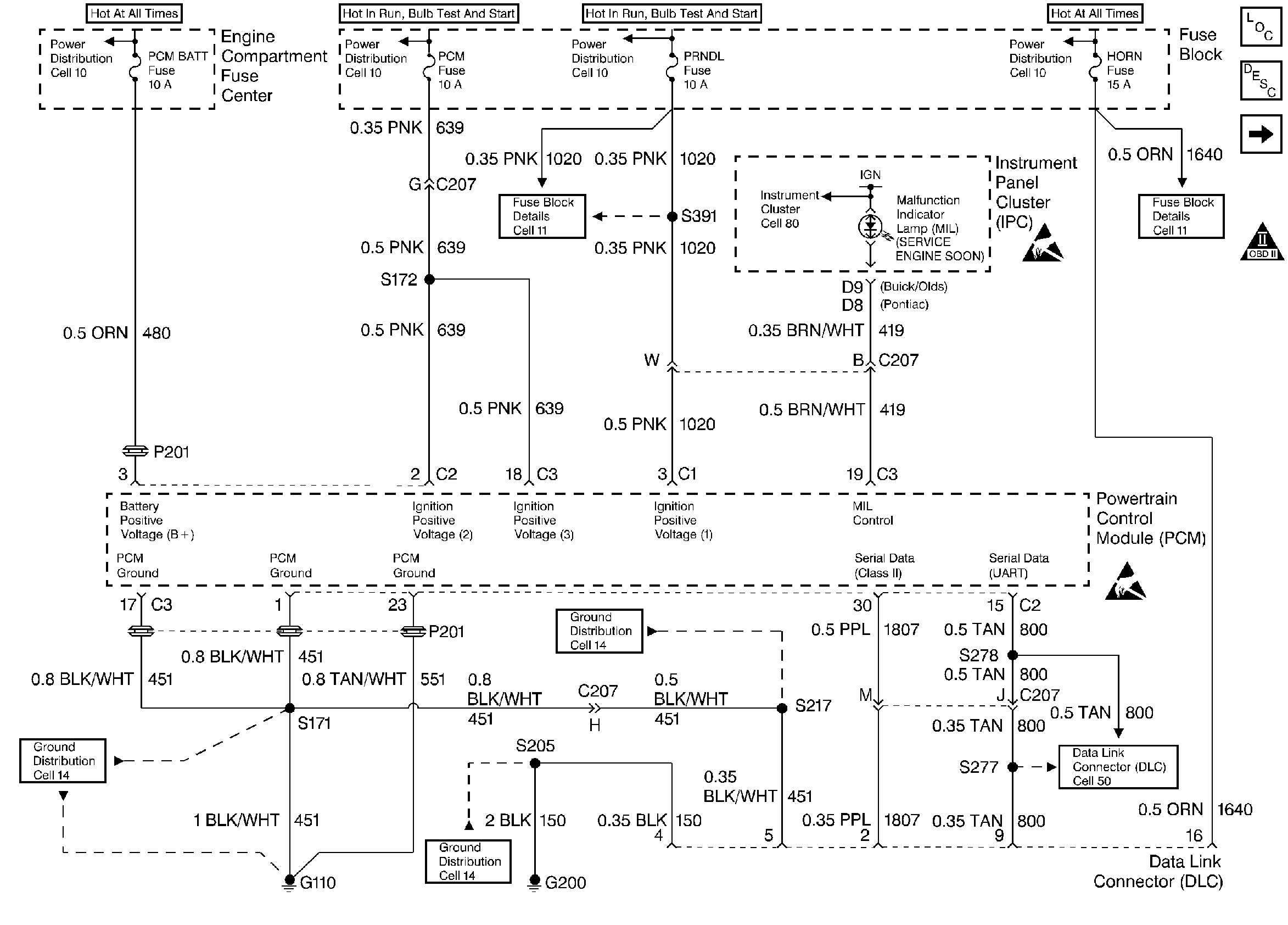Refer to
Power, Ground, MIL, and DLC

for wiring view.
Circuit Description
When the ignition is turned ON, the malfunction indicator lamp (MIL) will momentarily flash ON then OFF and remain ON until the engine is running, if no diagnostic trouble codes (DTCs) are stored. The powertrain control module (PCM) controls the MIL by providing a ground path through the MIL control circuit to turn ON the MIL.
Diagnostic Aids
An open ignition #1 fuse will cause the entire cluster to be inoperatve, and may set DTCs P1601 and P1629.
Check the battery and ignition 1 feed circuits for poor connections if the MIL is intermittent.
Any circuitry, that is suspected as causing an intermittent complaint, should be thoroughly checked for backed out terminals, improper mating, broken locks, improperly formed or damaged terminals, poor terminals to wiring connections or physical damage to wiring harness.
Test Description
Number(s) below refer to step number(s) on the Diagnostic Table.
-
The Powertrain OBD System Check prompts the technician to complete some basic checks and store the freeze frame and failure records data on the scan tool, if applicable. This creates an electronic copy of the data taken when the fault occurred. The information is stored in the scan tool for later reference.
-
If the engine fails to start and the MIL is inoperational, then the fault can be isolated to either the PCM Ignition Positive Voltage #2, the Battery Positive Voltage B+, a poor PCM ground at the engine block, or the PCM.
-
A MIL that responds correctly to the scan tool commands indicates that the fault is not present at this time or conditions has been corrected.
-
Probing the MIL circuit with a test light to ground simulates the PCM's control of the MIL. If the MIL illuminates, then the fault can be isolated to the control of the MIL.
-
Locate and repair any shorts that may have caused the fuse to open before replacing the fuse.
-
If the Ignition Positive Voltage #3 is open, DTC's P0748 and P0753 may also be set (electronic automatic transmission only).
-
Before replacing the PCM, check for backed out terminals, improper mating, broken locks, improperly formed or damaged terminals, poor terminals to wiring connections or physical damaged to the wiring harness. Replacement PCM's must be reprogrammed. Refer to the latest Techline information for programming procedures.
-
A shorted MIL circuit can be diagnosed with a scan tool. Refer to Powertrain Control Module Outputs Diagnosis .
-
An open MIL circuit can be diagnosed with a scan tool. Refer to Powertrain Control Module Outputs Diagnosis .
-
For MIL bulb replacement procedures, refer to Section 8C of the service manual.
-
For IPC replacement procedures, refer to Section 8C of the service manual.
-
PCM grounds will only cause a problem if all of the grounds are not making a good connection. If a PCM ground problem is suspected, the most probable place to check is where all the grounds meet, at the engine block.
Step | Action | Value(s) | Yes | No |
|---|---|---|---|---|
Was the Powertrain On-Board Diagnostic (OBD) System Check performed? | -- | |||
2 | Turn the ignition switch ON, with the engine OFF. Is the MIL ON? | -- | ||
Attempt to start the engine. Does the engine start? | -- | |||
Does the MIL turn ON and OFF when commanded? | -- | |||
Is the MIL ON? | -- | |||
Inspect the ignition and battery feed fuses. Are the fuses OK? | -- | |||
With a test light connected to ground, probe the ignition positive voltage #3 circuit. Does the test light illuminate? | -- | |||
8 | Did the test light illuminate? | -- | ||
9 |
Does the test light illuminate? | -- | ||
10 |
Is the action complete? | -- | -- | |
Is the action complete? | -- | -- | ||
12 | Repair the open in the ignition positive voltage #3. Is the action complete? | -- | -- | |
Repair the short to voltage in the MIL control circuit. Is the action complete? | -- | -- | ||
Check for an open in the MIL control circuit and repair as necessary. Was a repair necessary? | -- | |||
15 | Check for an open in the ignition feed circuit or fuse to the MIL and repair as necessary. Was a repair necessary? | -- | ||
Check for an open MIL bulb and replace if necessary. Was a bulb replacement necessary? | -- | |||
Replace the IPC. Is the action complete? | -- | -- | ||
18 | Probe the battery positive voltage B+ circuit with a test light connected to ground. Does the test light illuminate? | -- | ||
19 | Repair the open in the ignition positive voltage #2 circuit. Is the action complete? | -- | -- | |
Check for a faulty PCM ground connection at the engine block and repair as necessary. Was a repair necessary? | -- | |||
21 | Repair the open in the battery positive voltage circuit. Is the action complete? | -- | -- | |
22 |
Are any DTC's displayed that have not been diagnosed? | -- | Go to the applicable DTC table | System OK |
